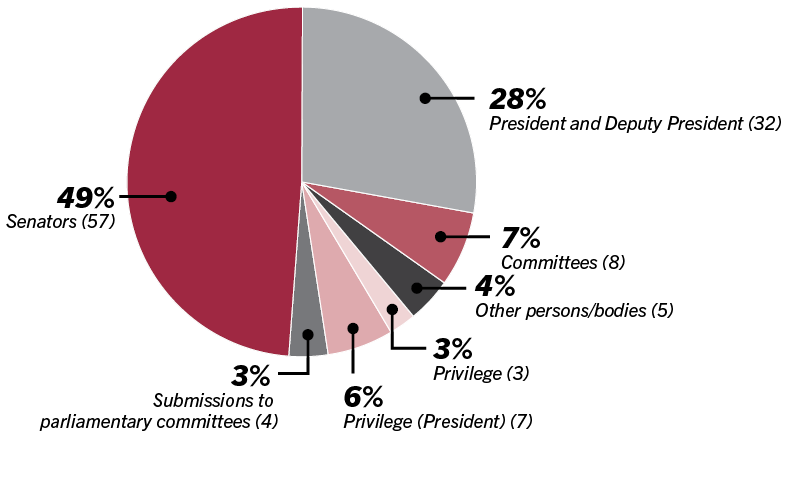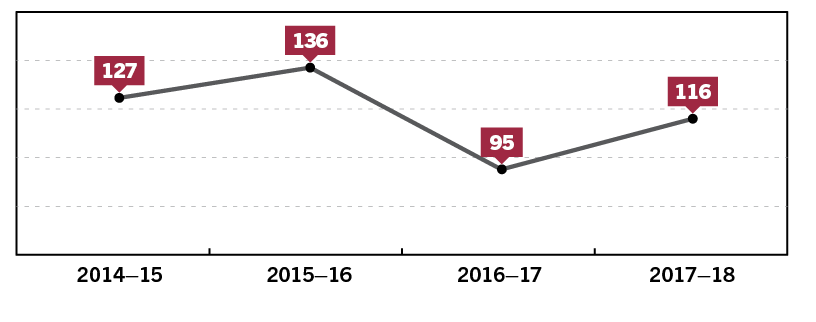|
Outputs
|
|
Advice on, and support for, proceedings of the Senate and its committees.
Leadership and strategic direction for the department.
Secretariat and advisory support to the Procedure and Privileges Committees.
Procedural information and related resources for senators and the department.
|
| Advice and support are sound and timely, and provided to the satisfaction of the President, other officeholders, Senate committees and senators so that they are able to fulfil their roles. |
Senators and other recipients of advice on powers, privileges and proceedings continued to acknowledge its accuracy and value.
Advice and support were invariably provided in time to meet procedural and operational requirements.
|
| The capacity of the department and its employees to provide advice and support meets operational requirements. |
Activities under the learning and development framework underpinned the department’s advisory and support capacities. |
| Governance structures advance the department’s accountability and the achievement of its outcome. |
Governance forums achieved all significant targets for the year, including managing budgeting and staffing targets.
Contributions to interdepartmental forums advanced the strategic aims of parliamentary administration.
|
| Advice, documentation, publications and draft reports are accurate, of a high standard and produced to meet the required timeframes. |
All advice, documents and draft reports produced in support of committees supported by the office were of a high standard and met required timeframes; none were shown to be inaccurate. |
| Odgers’ Australian Senate Practice is updated to reflect significant changes in the Senate.
The Procedural Information Bulletin is produced after each sitting period and other procedural resources are updated and augmented as required.
|
The Procedural Information Bulletin was produced promptly after sitting periods and estimates hearings.
Procedural and administrative information for senators was published to the intranet site, Senate Connect.
|
Overview
The Clerk is the administrative head of the Department of the Senate and, in accordance with the Parliamentary Service Act 1999, is responsible, under the President of the Senate, for managing the department. The Clerk is also the principal adviser to the President and senators on proceedings in the Senate, parliamentary privilege, committee proceedings and their outcomes in the Senate. The Deputy Clerk supports the Clerk in these roles and, with the Clerk Assistant (Procedure), provides procedural and legislative advice and support to non-executive senators. The Deputy Clerk also has particular corporate governance roles, including as the department’s senior representative on the Audit Committee and as chair of the Program Managers’ Group.
Until January 2018 the Clerk also led the Senate Public Information Office (SPIO). SPIO has now been established as a separate office under the responsibility of the Clerk Assistant (Table), and its work is described at pages 35–37.
The cost of the office for 2017–18 was $1.1m ($1.1m in 2016–17).
Advice and information
The provision of advice, particularly to the President, senators and parliamentary committees, is a core function of the department and a priority for the Clerk’s Office. Much advice is provided orally and instantaneously, particularly in the Senate chamber and to senators who seek advice in person. Such advice is impossible to quantify in any meaningful way, but the number and kinds of written advices provide some indication of work undertaken.
Written advice
There was an increase in the number of requests for written advice this year following a reduction in the previous period, as might be expected in an election year. Some of the matters on which senators sought advice flowed from those in the previous year, including the reference to the High Court of questions about the qualification of senators; the allocation of three-year and six-year terms to senators in the new Senate, particularly in light of the disqualification of senators; and the establishment of a citizenship register for senators. Perennial topics, such as the powers of committees and the protection of witnesses, continued to feature, while advice was also sought on a number of aspects of parliamentary privilege. The Clerk made submissions to a number of parliamentary committees, notably the Parliamentary Joint Committee on Intelligence and Security inquiry into the proposed Foreign Influence Transparency Scheme. Figure 3 shows the number and kinds of written advices provided, and each kind as a proportion of the total, while figure 4 shows demand over recent years. Anecdotally, there has been a trend to shorter, less formal advice in many circumstances.
Figure 3 – Types of written advices provided by the Clerk, 2017—18

Figure 4 – Number of advices provided by the Clerk’s Office, 2014—15 to 2017—18

Performance indicators for provision of advice focus on timeliness and accuracy. Senators and other recipients of advice continued to acknowledge its accuracy and value, and it was invariably provided in time to meet the purposes for which it was sought. Most advice is provided on a confidential basis and any decision whether to release it, and on what basis, is for the recipient to make. On several occasions during the year, recipients of advice published it as a contribution to public debate, at the same time subjecting it to public scrutiny. As this advice can inform the actions of senators, the Senate and its committees, as well as public debate, all advice is prepared to the highest standards and on the soundest possible basis.
Advice provided by the office was tested during estimates hearings and in other Senate and committee proceedings, with senators seeking and relying on such advice throughout the year.
Procedural information
The Clerk produced issues of the Procedural Information Bulletin after each sitting period and each round of estimates hearings, covering all the major procedural developments and matters of procedural interest which arose. Updates on procedural and administrative matters affecting senators were also published to an intranet site developed for senators and their staff, Senate Connect.
The Clerk and Deputy Clerk prepared and presented sessions in the department’s learning and development activities, and in other forums for parliamentary staff. They also provided introductory briefings to twelve senators whose terms commenced during the year.
Committees
The office provided secretariat support to two Senate standing committees. Advice and support was acknowledged as meeting the needs and timeframes of the committees and their members.
Procedure Committee
The Clerk of the Senate served as secretary to the Procedure Committee, which responds to references from the Senate or the President by evaluating, and recommending improvements to, Senate procedure.
During the year the committee met four times and presented two reports; one in December 2017 and the second in June 2018. Both reports considered the routine of business and hours of meeting resulting in amendments to the standing orders following the Senate’s agreement on 26 June 2018 to the 2018 report’s recommendations. The 2017 report also considered how to track public interest immunity claims, among other matters.
Committee of Privileges
The Deputy Clerk served as secretary to the Committee of Privileges, which met 13 times in 2017–18 (11 in 2016–17) and presented five reports. The committee protects the integrity of Senate and committee proceedings by considering matters possibly amounting to contempt of the Senate. Those matters, which arise from concerns raised by other committees or individual senators, are referred to the committee by the Senate.
The committee’s 168th report addressed the use of intrusive powers and questions of parliamentary privilege. It recommended that the Presiding Officers and the executive develop protocols to ensure that questions of privilege can be raised when law enforcement and intelligence agencies exercise intrusive powers. The recommendation was adopted by the Senate on 21 June 2018.
A possible contempt relating to the improper influence of a witness to a Senate committee inquiry was investigated and reported in the 166th report. The committee did not consider that a contempt had occurred, but noted that any decision to give evidence to a Senate committee or the nature of that evidence should not be part of commercial negotiations.
The committee also administers the right-of-reply mechanism for people seeking to respond to adverse comment made about them in the Senate. Four requests, two relating to the same matter, were received and reported on during the year in the 167th, 169th and 170th reports. The Senate adopted the recommendation of each report that the replies be incorporated in Hansard. The redress considered in the 167th report related to references made in a document tabled in the Senate. The committee considered whether the procedure extended to tabled documents and concluded that, in this case, the preparation of the document constituted part of parliamentary proceedings.
Governance
The Deputy Clerk chaired the Program Managers’ Group and was the department’s senior representative on its Audit Committee. More information on these forums is in the chapter ‘Management and accountability’.
During the year, the Clerk attended five meetings of the Heads of the Parliamentary Departments. This group generally meets quarterly and provides a forum across the parliamentary departments on administrative matters and strategic direction across the parliamentary service. At the commencement of the calendar year, the department assumed the secretariat duties of the group which is rotated on a yearly basis.
More broadly, the Clerk and other senior officers liaised with their counterparts in the other parliamentary departments on matters connected to parliamentary administration.
Performance outlook
In the next reporting period a federal election will be called. During an election year it is usual for legislative activity and committee workloads to decrease. The number of requests for advice is also likely to fall. This period provides the department and the Clerk’s Office with the opportunity to focus on strategic developments, including reviewing the body of work produced in the 45th Parliament and setting priorities for the department to meet the demands of the new Parliament. The opening of a new Parliament will require attention, and programs will be established for incoming senators.
A supplement to the 14th edition of Odgers’ Australian Senate Practice will be produced, taking account of recent procedural developments, as well as the succession of High Court judgments relating to disqualification of senators.
In the area of governance the next year will see a new Usher of the Black Rod added to the management team. A revised Audit Committee charter will be finalised following the release of updated guidance from the government on the role of audit committees, and the department will continue to examine the maturity of its performance framework under the Public Governance, Performance and Accountability Act 2013.